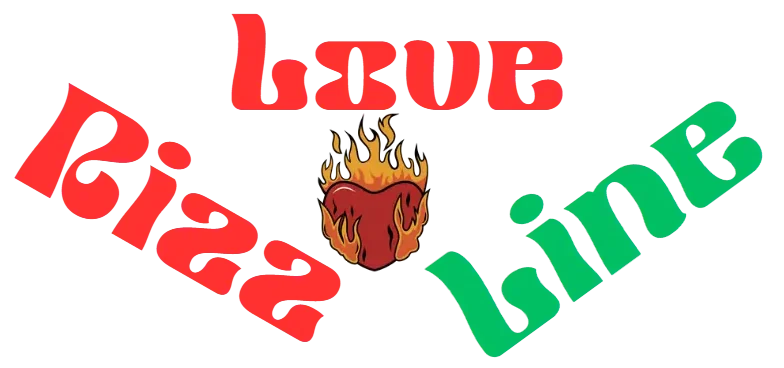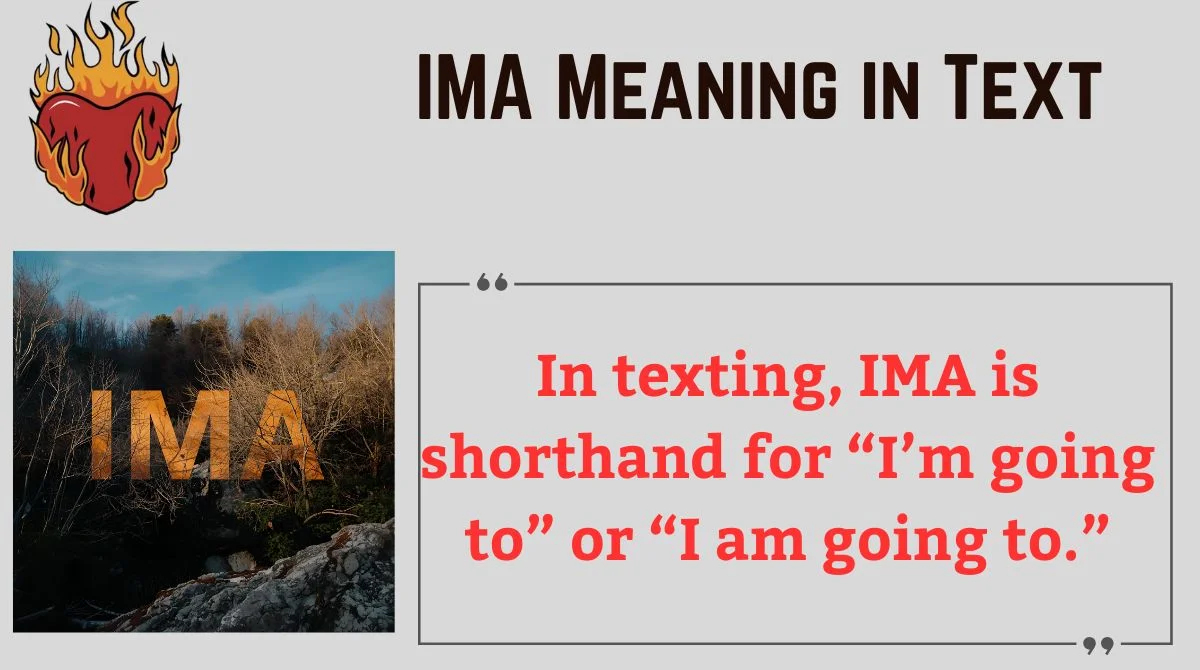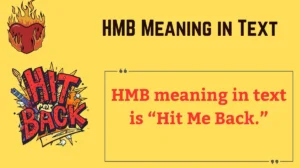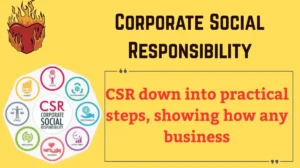Digital slang has taken over texting, social media, and online conversations. One term that keeps popping up everywhere is “IMA”.
It might look simple, but its usage is layered, cultural, and sometimes misunderstood.
This guide breaks down everything you need to know about IMA meaning in text—from its origin and usage to its place in online communities and professional settings.
Introduction: Why “IMA” Matters in Digital Communication
Language evolves fast, but slang moves even faster. Every few months, new shorthand terms emerge, and if you miss the trend, it’s easy to feel lost. “IMA” is one of those terms that jumped from speech to text and spread like wildfire across generations.
People use IMA to:
- Type faster without losing the meaning.
- Set a casual, laid-back tone.
- Mirror how they speak in real life.
Example:
“Ima call you in a bit.”
This isn’t formal grammar, but it communicates intent quickly and clearly.
Why it matters:
- It reflects how language adapts to technology.
- It can change the tone of a conversation.
- Misunderstanding it can create awkward moments.
Definition: What “IMA” Really Means
In texting, IMA is shorthand for “I’m going to” or “I am going to.”
It’s pronounced like “eye-mah.” It’s informal and fits casual conversations rather than formal writing.
| Term | Full Form | Pronunciation | Tone |
|---|---|---|---|
| IMA | I’m going to / I am going to | Eye-mah | Informal, casual |
Example Sentences:
- Ima text you later. → I’m going to text you later.
- Ima grab some coffee. → I am going to grab some coffee.
- Ima see what happens. → I’m going to see what happens.
It’s not an acronym here. It’s a phonetic spelling of how “I’m going to” sounds when spoken quickly.
Origin & Linguistic Background
IMA comes from spoken American English, especially from African American Vernacular English (AAVE). It’s a phonetic contraction of “I’m gonna” or “I’m going to.” Over time, this informal speech pattern slipped into text messages, lyrics, and online slang.
Timeline of “IMA”
| Era | Development |
|---|---|
| 1980s–1990s | Popularized in hip-hop lyrics and AAVE communities |
| Early 2000s | Appears in online chat rooms, SMS, and MySpace |
| 2010s | Mainstream usage in Twitter, memes, and casual texting |
| 2020s | Widespread in Gen Z communication and digital platforms |
Why it spread so fast:
- Easy to type.
- Mirrors real speech.
- Fits the fast pace of texting culture.
- Influenced by music and social media trends.
Quote: “Slang is born in speech, raised in songs, and lives forever online.”
How “IMA” Is Used in Different Contexts
Casual Conversations
People use “IMA” in everyday texting to keep things light and quick.
- Ima head out.
- Ima eat first.
- Ima be late but I’m coming.
It signals informality and often conveys immediacy.
Pop Culture
Rap lyrics and meme culture have made “IMA” iconic. You’ll spot it in:
- Song titles and hooks (“Ima Do Me” by Rocko).
- Viral memes and reaction GIFs.
- Trendy captions and comments.
Online Communities & Gaming
In gaming chats or Discord servers, IMA often appears when someone’s about to act.
- Ima rush mid.
- Ima log off.
- Ima heal the team.
Dating Apps
“IMA” can set a playful or casual tone.
- Ima text you tomorrow. (shows intent without pressure)
- Ima see you Friday. (soft commitment)
Key takeaway:
Context changes how “IMA” feels—friendly, assertive, or chill.
Common Misconceptions & Mistakes
Despite its simplicity, IMA often gets misread.
Common Misunderstandings
- “IMA” ≠ acronym: Some people confuse it with organizations like Institute of Management Accountants (IMA).
- Tone confusion: Without punctuation, it can sound abrupt.
- Ima talk to you later can sound neutral or annoyed depending on context.
- Spelling mix-ups: “I’ma,” “ima,” and “IMA” all exist, but they mean the same in texting.
Mistakes to Avoid
- Using it in formal writing.
- Overusing it in serious conversations.
- Assuming everyone knows the slang.
Pro Tip: Add emojis or punctuation if the tone might be misunderstood.
Ima call you 😊 feels warmer than Ima call you.
Similar Terms & Text Alternatives
“IMA” isn’t the only way to shorten “I’m going to.” Here are common alternatives:
| Term | Meaning | Formality | Use Case |
|---|---|---|---|
| Gonna | Going to | Informal | Casual texting |
| I’ll | I will | Neutral | Any context |
| I’m about to | Immediate action | Neutral | Neutral tone |
| Ima | I’m going to | Very informal | Friends, casual chats |
Examples:
- Gonna hit the gym. (similar vibe)
- I’ll talk to you tomorrow. (more formal)
- I’m about to leave. (slightly more structured)
Why this matters: Choosing the right variation can subtly shift tone, intent, and clarity.
How to Respond When Someone Says “IMA”
Understanding tone helps craft the perfect reply.
Friendly Conversations
When the tone is light or playful:
- Okay cool 😎
- Alright, Ima wait then.
- Sounds good!
Professional or Serious Settings
If “IMA” pops up in a semi-formal chat (like Slack), shift tone gently:
- Alright, sounds good.
- No problem, take your time.
- Thanks for the update.
When It’s Unclear
Sometimes slang can blur meaning. It’s okay to ask politely:
- Hey, just to be sure—do you mean you’ll call me later?
- Did you mean now or later?
Pro Tip: Always match or slightly elevate the tone of the person texting.
Regional, Cultural & Generational Variations
IMA is understood widely in the US, but its usage varies across regions and age groups.
| Group | Usage Style | Notes |
|---|---|---|
| Gen Z | Heavy use, often without punctuation | Ima go eat |
| Millennials | Moderate use, often lowercase | ima call later |
| Boomers | Less common, often misunderstood | Might read it as acronym |
| Non-US Regions | Less frequent, often learned through pop culture | Seen in memes, music |
- In urban US communities, IMA is deeply tied to AAVE speech patterns.
- In international English contexts, it’s recognized but not always used naturally.
- Generational gap plays a role—older people may interpret it differently.
Comparison With Similar Slang Phrases
To understand where “IMA” fits, compare it with other common shorthand:
| Phrase | Meaning | Tone | Usage Frequency |
|---|---|---|---|
| IMA | I’m going to | Very casual | High |
| Gonna | Going to | Casual | High |
| BRB | Be right back | Neutral | High |
| TTYL | Talk to you later | Friendly | Medium |
| I’ll | I will | Neutral | High |
“IMA” is tone-soft and often implies immediate or near-future action. BRB and TTYL lean more toward signing off a conversation.
Usage in Online Communities, Memes & Dating Apps
Online spaces shape how slang spreads.
Memes & Humor
“Ima head out” memes became iconic thanks to SpongeBob.
- Ima head out = I’m leaving this awkward situation.
- Widely used as reaction GIFs or sarcastic captions.
Gaming & Discord
- Ima queue up another match.
- Ima AFK for 5 mins. (AFK = away from keyboard)
Dating Apps
- Ima text you tomorrow 😏 (playful)
- Ima be honest… (soft opener for serious talk)
Fun Fact: “Ima” messages tend to sound less formal and more approachable, which often increases response rates in casual chats.
Hidden or Offensive Interpretations (and Why Context Matters)
While IMA is usually harmless, context can twist its meaning.
When It Can Sound Rude
- Short, punctuation-free texts can seem cold.
- Ima talk to you later → might read as I don’t want to talk now.
- Abrupt usage in tense conversations can be misread as dismissal.
When It’s Misinterpreted
- Some non-native speakers may not recognize it as slang and mistake it for a name or acronym.
- Tone shifts can happen depending on emoji use, caps, or speed of reply.
Examples:
- IMA SEE YOU. (aggressive tone)
- Ima see you 😉 (playful tone)
Suitability in Professional or Academic Communication
IMA doesn’t belong in formal emails, reports, or workplace chats unless you share a close, casual rapport with the recipient.
Why to Avoid:
- It can seem unprofessional or sloppy.
- Not everyone will understand the slang.
- It weakens the credibility of formal messages.
Better Alternatives:
- Instead of Ima call you later → I will call you later.
- Instead of Ima send the file → I’m going to send the file shortly.
Rule of Thumb: If you wouldn’t say it in a meeting, don’t type it in a work email.
FAQs
What does IMA mean in text?
It means “I’m going to” or “I am going to.” It’s slang used in casual texting.
Is IMA an acronym?
Not in texting. It’s a phonetic contraction. But it can also stand for organizations like Institute of Management Accountants in other contexts.
Is it okay to use IMA at work?
No, not in formal communication. Use “I will” or “I’m going to” instead.
Is IMA the same as Gonna?
Very similar, but “IMA” often implies personal intent while “gonna” is more general.
How do you pronounce IMA?
It’s pronounced “eye-mah,” mimicking the way “I’m gonna” sounds in speech.
Final Thoughts
IMA may look like just three letters, but it represents a living piece of language evolution. It mirrors how people speak, joke, flirt, and express themselves online.
- It’s casual, punchy, and widely recognized.
- It reflects cultural roots, especially from AAVE.
- Misusing it in formal settings can create misunderstandings.
- Using it right helps your messages sound natural and approachable.
The next time you see “IMA,” you’ll know exactly what it means—and how to respond like a pro.

Mark Peter is the creative mind behind RizzleLineLove.com, your go-to hub for witty, flirty, and downright hilarious pick-up lines. With a passion for blending humor and charm, Mark crafts content that sparks conversations, breaks the ice, and adds a playful twist to everyday moments.
Whether you’re looking to impress your crush, make your friends laugh, or spice up your social media captions, his work is all about helping you connect — one clever line at a time.



